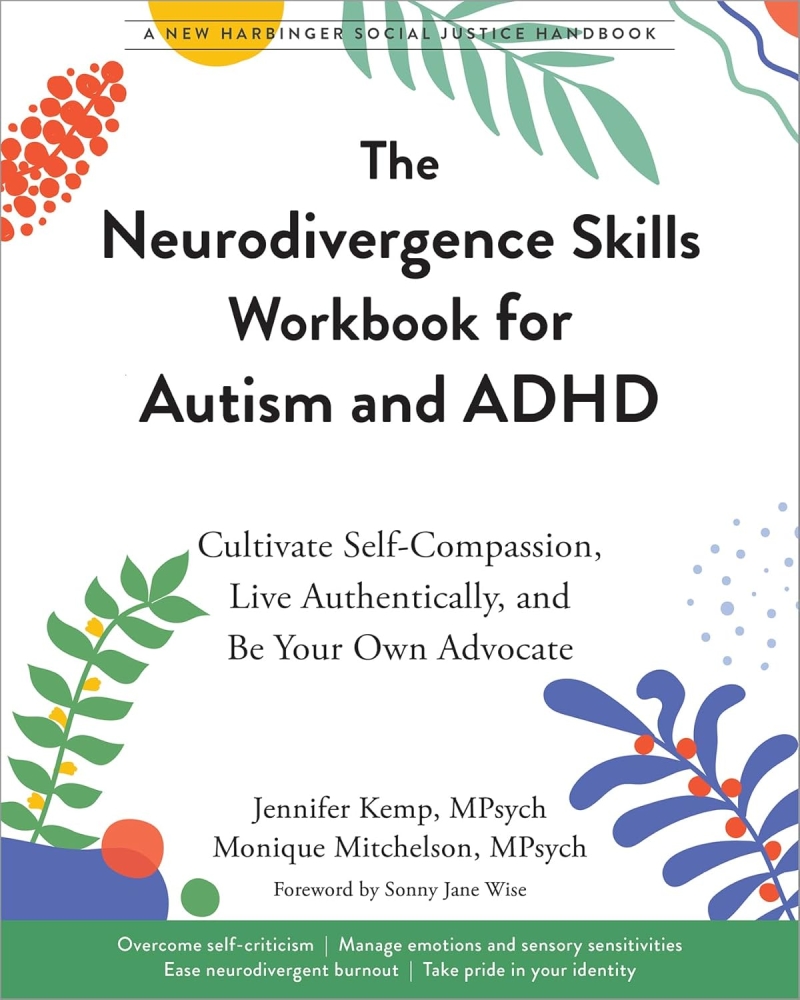As an autistic person or neurodivergent individual with attention-deficit hyperactivity disorder (ADHD), you may sometimes feel as if you’re living in a world that wasn’t designed for you. You may have sensory sensitivities, social difficulties, struggles with executive functioning, sleep issues, depression, anxiety, burnout and meltdowns, and trauma from a lifetime of marginalization and microaggressions.
If you are struggling with your neurodivergent identity, know that you aren’t alone. Whether you were diagnosed as a child or are just now realizing your difference, this workbook can help you move beyond the internalized message that there is something wrong with you, so you can embrace who you really are and manage stress before it leads to neurodivergent burnout.
The Neurodivergence Skills Workbook for Autism and ADHD offers acceptance and commitment therapy (ACT) and self-compassion skills tailored to the needs of neurodiverse people—especially those with ADHD and Autism—so you can live authentically, take pride in your identity, increase overall well-being, and build meaningful connections to thrive as a neurodivergent person in the modern world.
This workbook will help you:
- Acknowledge your needs and be your own advocate
- Unmask and express your authentic self
- Reduce sensory overload and balance emotions
- Manage rejection sensitivity dysphoria (RSD) and social anxiety
- Build meaningful social connections
- Improve executive functioning to get more done
- Adjust your environment to better fit your needs
Most importantly, you’ll learn to take pride in your identity. Whether you’re autistic, ADHD, or both, this workbook can help you overcome self-critical thinking, advocate for yourself in effective ways, and learn practical skills to help you thrive as your authentic self.
About the Author
Jennifer Kemp, MPsych, is a privately practicing clinical psychologist based in Adelaide, South Australia, who works with neurodivergent adults experiencing perfectionism, eating disorders, obsessive-compulsive disorder (OCD), and chronic illness. Using a neurodiversity-affirming approach, Jennifer weaves together acceptance and commitment therapy (ACT), and behavioral and compassion-focused approaches with her own lived experience as a late-diagnosed Autistic ADHDer, to help her clients improve their mental health and develop greater self-compassion, self-acceptance, and pride in their neurodivergent identity. Jennifer juggles clinical practice with writing, presenting, and clinical supervision. She is author of The ACT Workbook for Perfectionism.
Monique Mitchelson, MPsych, is an Autistic and ADHD clinical psychologist working in private practice in Brisbane, Australia. She is cohost of The Neurodivergent Woman Podcast, balancing this with private clients, consultations, training, advocacy, and advising on policy. Monique has a particular interest in the intersection between trauma, chronic illness/pain, and neurodivergence, and works therapeutically with neurodivergent adults using ACT, mindfulness, compassion-focused approaches, and eye movement desensitization and reprocessing (EMDR).


lit chick –
This buck is one of the best resources I have found since receiving my diagnosis. It meant so much to me to be able to read something designed by people who had both lived and professional experience. I have been looking for a resource that was customized to the needs of AuDHD. I would recommend taking a look at the sample first to make sure that the workbook Approach and format are a good fit for you. I am taking my time with this and appreciate it is something that I cannot rush through. I feel like I’m getting to know myself. I can’t recommend this highly enough.
Jen –
Autistic therapist here who works with a lot of autistic clients. I absolutely LOVE this workbook. It captures concept after concept I’ve discussed with clients in session in clear and judgement-free ways. Love it so much that I’m back here buying my third round of copies because it has been that useful to me and my clients.
Chris Mitchell #DefineYourself –
The book, “The Neurodivergence Skills Workbook for Autism and ADHD: Cultivate Self-Compassion, Live Authentically, and Be Your Own Advocate” by Jennifer Kemp Mpsych and Monique Mitchelson Mpsych starts out by breaking down the traits of Autism and ADHD in great detail.In the first 2 chapters, the authors explain in greater detail not only what traits such as stimming is, they also provide a thorough list of examples of each trait.Chapter 3, from chronic burnout to living well does an excellent job of explaining burnout (which is more common in Autism than ADHD). The chapter gave me the impression that they would share ways we can get out of burnout, but in my opinion this expectation was not met for me.The workbook also covers topics including overwhelming emotions, suggestions on how to stop beating yourself up and start getting stuff done, how to develop safe and supportive relationships (which is very important for everyone – especially for those of us who are neurodiverse), safely unmasking (yes, although Autistics are known for masking, ADHDers also mask), and how to create a world that works best for you.This workbook is truly a workbook with plenty of activities for you to do that will help you better understand yourself as either an Autistic adult, ADHDer or as a AuDHDer,I recommend this resource for everyone who identifies as an Autistic adult, an ADHDer or both.
kristen –
if ur the same kind of neurodivergent as me where u need super direct,specific instructions don’t bother. i’m looking at a chart with no idea if we’re supposed to fill it with preferences or aversions. not written clearly at all but god does it ramble
ace86 –
Highly recommend!
You know how it sometimes feels like there are a million pieces of neurodivergent-related information floating around in your head? Well, this book puts all of that into a structured and organised format (amazing!). It helps you understand yourself and your ND pals better. It’s super easy to read, practical, and leads you on a journey of acceptance and self love. Plus, it acknowledges the tough challenges we face and normalises them. How often have we felt like our struggles aren’t normal, right!? This book proves there’s a place for ND people in the world and introduces you to an amazing community that’s learning to thrive together.